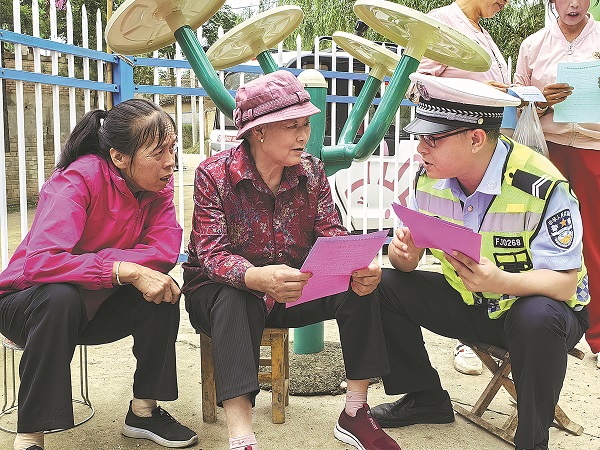Officials helping to drive countryside developments

A police officer hands out leaflets about legal issues to villagers in Pingliang, Gansu province. [Photo/CHINA DAILY]
Village legal advisers are playing a pivotal role in driving the rapid development of China's rural areas.
They not only offer legal safeguards for the growth of village industries, such as seed production, livestock breeding and cultural tourism, but also address residents' law-related demands, said Wang Xin, director of the village committee of Suzhan village in Zhangye, Gansu province.
"It is inevitable that a range of legal issues arise amid the process of village development. As village cadres, we are not legal experts. Sometimes, actions may seem reasonable based on experience, but they may not be legal. Legal advisers can help us review the relevant content and provide professional suggestions, especially in matters related to contract agreements and specialized terminology," he said.
Wang said that in the past, officials handled a range of conflicts and disputes based on village traditions, experience and the influence of a mediator, rather than following strict legal procedures.
This approach had its drawbacks: some villagers may have agreed with the results of meditation in a financial dispute one day, but regretted it the next, wasting cadres' time and efforts.
Now, however, legal advisers provide free services: they tell the villagers how to avoid such disputes in the early stages and explain how people can defend their rights via legal channels if disputes occur, he said.
Through years of providing villagers with legal knowledge, the advisers' awareness of the law has grown. For example, they now require labor contracts to be signed before working in village enterprises, fully safeguarding their rights and avoiding potential time-wasting issues and disputes later, he said.
According to the department of justice in Gansu, the province has 15,035 rural public legal service stations, while legal advisers cover all 17,494 villages and communities in the province, providing legal consultations about land disputes, environmental pollution, marriage and family, and food and drugs.
In February, the Communist Party of China Central Committee and the State Council, China's Cabinet, issued a document underlining the key tasks to comprehensively promote rural vitalization this year.
The measures included the strengthening of legal education and services in rural areas, as well as improvements to a wide-ranging mechanism for preventing, mediating and resolving social conflicts and disputes.
In March 2020, the Central Commission for Law-based Governance released a document that stressed the provision of inclusive, efficient and high-quality legal services for rural areas. It also implemented the policy of "one village, one legal adviser" with standardized service content and innovative methods to help grassroots organizations and people deal with law-related affairs.
The Ministry of Justice said that 600,000 villages and communities across the country have appointed advisers, with 180,000 legal professionals, including lawyers and grassroots personnel, participating in the work.
With the exception of a few remote villages in the central and western regions, full coverage has been achieved, it added.
Village legal advisers are playing a pivotal role in driving the rapid development of China's rural areas.
They not only offer legal safeguards for the growth of village industries, such as seed production, livestock breeding and cultural tourism, but also address residents' law-related demands, said Wang Xin, director of the village committee of Suzhan village in Zhangye, Gansu province.
"It is inevitable that a range of legal issues arise amid the process of village development. As village cadres, we are not legal experts. Sometimes, actions may seem reasonable based on experience, but they may not be legal. Legal advisers can help us review the relevant content and provide professional suggestions, especially in matters related to contract agreements and specialized terminology," he said.
Wang said that in the past, officials handled a range of conflicts and disputes based on village traditions, experience and the influence of a mediator, rather than following strict legal procedures.
This approach had its drawbacks: some villagers may have agreed with the results of meditation in a financial dispute one day, but regretted it the next, wasting cadres' time and efforts.
Now, however, legal advisers provide free services: they tell the villagers how to avoid such disputes in the early stages and explain how people can defend their rights via legal channels if disputes occur, he said.
Through years of providing villagers with legal knowledge, the advisers' awareness of the law has grown. For example, they now require labor contracts to be signed before working in village enterprises, fully safeguarding their rights and avoiding potential time-wasting issues and disputes later, he said.
According to the department of justice in Gansu, the province has 15,035 rural public legal service stations, while legal advisers cover all 17,494 villages and communities in the province, providing legal consultations about land disputes, environmental pollution, marriage and family, and food and drugs.
In February, the Communist Party of China Central Committee and the State Council, China's Cabinet, issued a document underlining the key tasks to comprehensively promote rural vitalization this year.
The measures included the strengthening of legal education and services in rural areas, as well as improvements to a wide-ranging mechanism for preventing, mediating and resolving social conflicts and disputes.
In March 2020, the Central Commission for Law-based Governance released a document that stressed the provision of inclusive, efficient and high-quality legal services for rural areas. It also implemented the policy of "one village, one legal adviser" with standardized service content and innovative methods to help grassroots organizations and people deal with law-related affairs.
The Ministry of Justice said that 600,000 villages and communities across the country have appointed advisers, with 180,000 legal professionals, including lawyers and grassroots personnel, participating in the work.
With the exception of a few remote villages in the central and western regions, full coverage has been achieved, it added.

Ministry of Justice of the
People's Republic of China
All rights reserved. Presented by China Daily.
京ICP备13016994号-2


